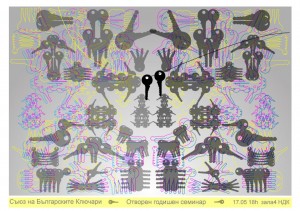The Lolita Cover Contest has ended and I want to express my heartfelt thanks to everyone who took the plunge and participated. Your efforts made it so intriguing! In all, 105 entrants from 34 countries submitted a total of 155 entries (multiple entries being allowed). After the US and the UK, Poland and India had the most submissions with five each.
This was an extremely difficult exercise. There were interesting submissions on many different levels and it was quite wonderful to simultaneously review them all. In retrospect, however, I would not have limited the contest to one winner. I realized perhaps too late the inevitable arbitrary nature of this exercise and, forced to choose between conceptually different entries of equal merit, I developed my own rules in order to decide between them. My personal bias leans towards simple, elegant, graphically strong designs and typeface is important but remember that I am not a graphic designer.
In judging the submissions I tended to avoid lingerie, lollipops, roses, hearts, lipstick prints, butterflies, heart shaped sunglasses, and overtly sexual poses (as well as the unexpected recurring themes of swings and Rorschach blots) which by now have been indelibly linked to the cultural concept “Lolita” if not the novel itself. It’s important to keep in mind that the novel may be considered a love story, but it’s not Lolita who is in love. And, of course, well beyond that one can explore the brutality and humor of the novel, the beauty of the prose and the cleverness of the wordplay. This is a tall order for a book cover, and of necessity draconian choices must be made.
I was able to narrow my selection to fifteen or so covers, from which I chose four that were conceptually quite different but all excellent. Keep in mind that any of these could have been first place covers.
The first prize goes to Lyuba Haleva of Bulgaria for her wonderfully lyrical submission.

Although arguably anachronistic in its imagery and typeface, the use of Lolita (and Annabel?) as Humbert’s wings perfectly communicate the novel’s poetry and Humbert’s high-minded yet deluded pursuit of fantasy and art. Since I felt this was a crucial component of the novel it ultimately edged out others that leaned towards a darker reading.
As runners up I chose covers by Aleksander Bak of Poland, Derek McCalla of the United States, and Egor Krasnoperov of Russia (click on each cover for a larger image).
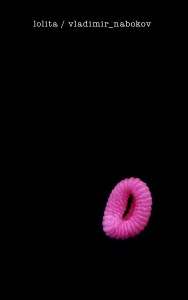 This reductive exercise by Aleksander Bak is sad, lurid, even funny. The lone unmoored pink scrunchy manages to be a potent symbol: surrounded by black, it’s s a memento mori representing Humbert’s loss of Lolita and the tragedy of the novel in general. Inevitably, of course, it’s also a stand in for an orifice (you decide whose and which one). The tension between the base and the sublime is wonderful and the composition is wonderful.
This reductive exercise by Aleksander Bak is sad, lurid, even funny. The lone unmoored pink scrunchy manages to be a potent symbol: surrounded by black, it’s s a memento mori representing Humbert’s loss of Lolita and the tragedy of the novel in general. Inevitably, of course, it’s also a stand in for an orifice (you decide whose and which one). The tension between the base and the sublime is wonderful and the composition is wonderful.

Derek McCalla’s image is shocking, almost radical. I see it as a witness to Humbert’s destruction of Lolita’s childhood through narcissistic acts of manipulation. In many ways it’s a grim book (let’s not forget that practically everyone dies). Interestingly, Chris Pritchett, McCalla’s instructor at Virginia Tech used this contest as an exercise for his screenprinting class which is offered through the university’s architecture department and populated by first-year though fifth-year architecture students. I asked Pritchett why he had chosen to use this as an assignment:
“I felt this was a good project for architecture students because as a graphic exercise they are forced to convey a wide range of emotion through one image.”
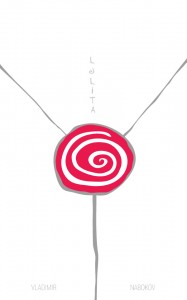
Egor Krasnoperov cleverly and humorously gives us a triple-entendre, at least the way I see this. First of course, there is the lollipop theme, present in all its banality, but rendered here beautifully and naively; then the circle that censors Lolita’s crotch, and, finally, the hypnotic vortex into which Humbert has fallen and which, quite literally, centers on Lolita’s sexuality. Pretty wonderful for such a minimal image.

John Gall, vice president and art director at Vintage/Anchor Books and designer of the latest cover of Lolita (see samples of his work here), kindly agreed to review the submissions and picked his own top choices. His favorite is by Suzene Ang of Singapore:
“It takes a second before you see what is going on. It’s abstract enough to keep it metaphorical, yet literal enough to imply a sense of story. I love the tease of having the type run up the leg. Elegant, with a sense of humor.”
He also liked the Aleksander Bak cover that was one of my top choices:
“For second place I like the simplicity of the hair scrunchy design. Nice double entendre. I worry though, that it might be too much of a contemporary reference.”
Gall made a point a few times of stressing the difficulty of the task:
“This is a tough assignment. So many clichéd images to either avoid or make new. Not an easy task. I teach a cover design class and wouldn’t give this as an assignment in a million years!”
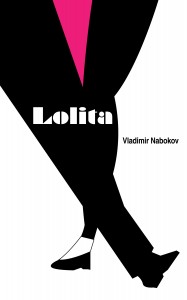
I also asked Barbara Bloom to weigh in, an artist whose Nabokov-themed work has involved the use of existing Lolita book covers in addition to designing her own, not only for Lolita, but also much of the Nabokov ouevre :
“As a matter of principle, I rejected all of the: (sucking) lollypop remakes, lurid images of young girls, underwear, heart shaped anythings. I have chosen a few covers not so much for their style of rendering, or excellence in typographic or design strategies. These are covers that seem to have a more complex and psychological reading of the text.”
She selected as her favorite an entry by Lucie Lebaz of the UK (in fact she liked three by Lebaz):
“Like that they form ONE body together. And LOVE the pink triangle.”
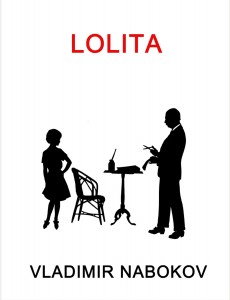
Above is Bloom’s own cover. Susan Tallman, in her essay in the artist’s monograph, writes:
“Most remarkable, however, is the absurdly apropos silhouette BB found for the cover of Lolita: the pompous (and paunchy) Nabokovian male at the lectern, the saucy stance of the little girl (the word ‘minx’ seems almost unavoidable) who thrusts her hip at his tendentious fingers. One does wonder what other purpose the image could ever have served.”
Addendum: Bloom also listed Aleksander Bak’s scrunchy cover among her favorites. Since we all liked his fantastic cover he will be awarded a special prize.
You can find all of the entries here: Lolita Submissions
And a list of all entrants including state and country: Entrants List
Now, shall we make this an annual contest? Let me know…
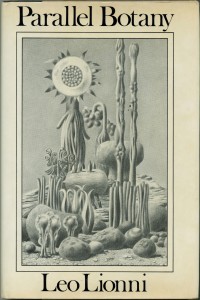 As sly as any work by Nabokov, Leo Lionni’s Parallel Botany from 1977 is a fantastic exploration of “parallel plants” the study of which T.J. Nelson, in his review of the book, states “has often been under appreciated and ignored by other biologists, almost, one might say, a backwater in which progress has been slow and difficult. There are, of course, many reasons for this; but chiefly, the principal difficulty with studying parallel plants is their lack of a basic property possessed by the vast majority of other, non-parallel plants, namely the property of `existence‘.”
As sly as any work by Nabokov, Leo Lionni’s Parallel Botany from 1977 is a fantastic exploration of “parallel plants” the study of which T.J. Nelson, in his review of the book, states “has often been under appreciated and ignored by other biologists, almost, one might say, a backwater in which progress has been slow and difficult. There are, of course, many reasons for this; but chiefly, the principal difficulty with studying parallel plants is their lack of a basic property possessed by the vast majority of other, non-parallel plants, namely the property of `existence‘.”
